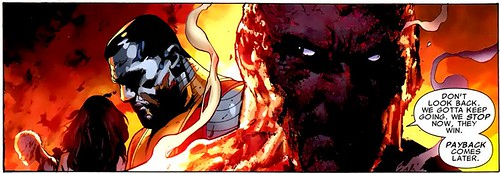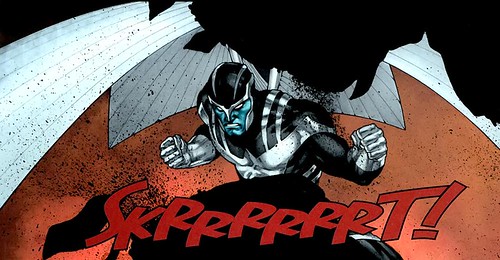Tucker Has No Experience With Which To Gauge These Comics Properly
/This is a bit too long and overly friendly, so it's buried under the cut where Chris and Sean won't have to read it. It's about this X-Men Second Coming shindig. And me. It's too long. Also spoilers. "Second Coming" is the overall title for the current X-Men cross-over mini-event story arc. It's operating on a weekly basis, delivering one chapter a week. (Last week saw the release of the first unnecessary and terrible tie-in issue, called "X-Factor: Second Coming: Revelations.) It has another nine chapters left to go. The basic plot of the story is that "Hope", the only new mutant to have been born since "M-Day" has returned to the current X-Men timeline, and she is being targeted for execution by a hybrid group of mutant-haters, who are apparently led by a cyborg character named Bastion. That's not a very easy sentence to swallow, but it contains the minimum amount of pertinent information required to keep up with the story. (Whether or not that is enough to enjoy the story is, of course, your personal call.)
 Each of the chapters has, so far, depicted a very short amount of time--the fourth installment is the only one that may stretch beyond an hour--and each issue has consisted primarily of fighting between the soldiers of the two groups. As of the most recent installment, Nightcrawler is dead, and a lesser-known character named Ariel died last week. The bad guys have seen a much higher rate of loss, but it's difficult to tell how high their body count actually is--they have a lot of cannon fodder, and lots of them die each issue.
Each of the chapters has, so far, depicted a very short amount of time--the fourth installment is the only one that may stretch beyond an hour--and each issue has consisted primarily of fighting between the soldiers of the two groups. As of the most recent installment, Nightcrawler is dead, and a lesser-known character named Ariel died last week. The bad guys have seen a much higher rate of loss, but it's difficult to tell how high their body count actually is--they have a lot of cannon fodder, and lots of them die each issue.
I don't read X-Men comics on a regular basis, and I never have for a consistent period of time. (I did read the Grant Morrison stories in collections, but they've always struck me as Grant Morrison comics more than they were X-Men comics, and according to the Internet, Marvel felt exactly the same way.) But for the past five years or so, I've been taking a chance whenever the X-Men comics do their big X-Men crossover events. It wasn't until I thought about writing about Second Coming for this site that I realized something, which is I have no idea why I've been doing that. I've picked up and read the first issues of Messiah Complex, Messiah War, Utopia, House of M, that Brubaker thing about space, those Whedon things where he put Buffy on the team, that Chuck Austen thing that I guess caused swine flu?, and whatever that one was where Cyclops didn't trust his judgment and Nightcrawler kept yammering about somebody named "Gott"-and yet, I couldn't tell you what the impulse was. There were a couple of times where it was the creator's involved that pulled me in, but otherwise, this was just blindly buying something out of an undefined desire for...what? It wasn't because I was writing blog posts about them, because I didn't have a blog for most of them. It wasn't because I wanted to be able to talk to X-Men superfans, because the only one I know is this guy, and we have more fun talking about horrible things that people say.
And yet, here I am again, and I've found myself looking forward to the new chapters of this thing, this beastly, 14 part weekly story. There's yet to be an issue featuring an artist I care for, I harbor no nostalgic memory for any of the characters or their relationships with one another, and while four out of the five issues have been written by different people, all of the issues have featured the exact same re-arranged story beats. (Fighting, military style orders, short Jack Bauer one-liners followed by murder, some measure of tragedy). For whatever reason, this--the most simplistic example of an X-Men story as I could imagine--works for me in a way that absolutely none of their comics ever have before.
Part of my interest certainly began when I discovered the last two years of Cable comic books. If you didn't read it, Cable was the sort of horrible writing assignment one would expect dictated from someone like Dan Didio, a comic where a writer was hired to keep two characters occupied until the time was reached when rest of the X-Men books were prepared for these two characters to return. The book wasn't particularly interesting on an individual issue basis, but taken as a whole, it's weirdly fascinating stuff. Within its 24 issues, Duane Swierczynski was seemingly allowed to do whatever he wanted, as long as what he wanted involved Cable, the aforementioned Hope, and Bishop. The setting for the book changed throughout, but the basic plot never did--like some kind of long-form Krazy Kat story, Bishop ran after Cable and Hope while trying to kill them, and Hope and Cable tried not to die. (There was a brief X-cross-over break early on, but all of the visiting characters were incorporated into Duane's "run after Cable and Hope" format.) My interest in the book was born solely out of the desire to see Paul Gulacy draw Cable, but the constant repetition of the same plot device drew me to seek out as many of the issues as I could find without a lot of work. (Which was most of them.) Secretly, I hoped to find an issue that consisted of actual scenes where Hope and Cable looked over their shoulder while running away from Bishop, and in issue #22, I found that exact thing.
It would be giving Swierczynski too much credit to claim that this was the best possible creative choice for his Cable assignment, but compared to the way so many recent editorial fiat types of stories turned out, he achieved a weird bit of wizardry with this task. Hope aged (but never became that interesting of a character), Bishop killed millions of people (but his bloodthirsty psychopathy never made a lot of sense), and all the while, the rest of the comic just incorporated a boatload of random window dressing while never notably changing its format. Cable and Hope ran. Bishop ran after them. An artist put different backdrops up behind them. Repeat, 24 times.
In a way, Second Coming hasn't added a whole lot to that general idea. It's added the marquee characters into the mix, sure, and the primary villain has changed, but it's still a book about one thing: people want to kill this girl. The good guys don't want that to happen.
Just past the horizon of the evening, I can hear various extrapolations of overly-considered essays about these comics bubbling up. Maybe something about race, and how it's kind of fucked up that Marvel published a story for two years about how a strong, virile black man wasn't able to catch a sick old white dude and a little girl despite being--you know, not old, sick, or a little girl. Maybe you could even take some of Matt Fraction's past remarks about Utopia--the island/survivalist compound the X-Men now live on--seriously, and you could pretend that M-Day has a parallel to the Holocaust, and that the X-Force team is a vaguely considered stand-in for the Mossad.
Somebody could totally do that. Hell, it's tasteless enough that it might even be me. Considering that today's chapter of Second Coming ended with Hope's arrival at the X-Men's private compound, the story might now slow down and become another insufferable attempt to incorporate lots of talking into an action story while the main characters keep their knife hands pensively closed.
For now though, I'm not that guy. I'm just going to call these fuckers GOOD, and leave it at that.
Oh, wait, one last thing.
I guess Nightcrawler died because he didn't have one what it takes?
He wasn't much of a team player, if you ask me.





















